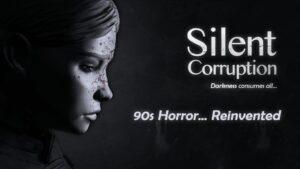As a game developer with over five years of experience using Unity, I found myself navigating new waters following Unity’s controversial decisions, such as the runtime fee and other unfavourable practices. Like many developers, I chose to explore different game engines and eventually started using Unreal Engine 5 (UE5). I have to say, I was genuinely impressed.
One of the most striking aspects of UE5 is its extensive features and constant updates and support. Despite this, I found myself missing Unity. Here’s why I’ve decided to return to Unity for my survival horror game, “Silent Corruption.”
Comfort and Efficiency
Having used Unity for over five years, I am extremely comfortable with its interface and workflow. As a solo developer, it’s crucial to spend my time, money, and effort wisely. Learning a new engine is neither practical nor efficient for me. I have already invested years in mastering the technical aspects of game development in Unity. Why start from scratch when I can focus on what truly matters – creating my game? My familiarity with Unity means I can hit the ground running, minimising the time spent on learning curves and maximising productivity.
Shifting Priorities
Initially, one of my motivations for learning Unreal Engine was to enhance my employability as a programmer. However, with the current state of the AAA game industry, my priorities have shifted. My goal has always been to create my own games and be an indie game developer. Given the industry’s challenges, I’ve decided to focus on creating my own job rather than seeking one. So, the need to learn another engine for better job prospects is no longer relevant, as I’m now fully committed to working on my game. This shift in focus underscores the importance of using tools that serve my immediate goals and long-term vision.
Love for C# Programming
While UE5’s visual scripting feature, Blueprint, is powerful, I miss the joy of writing lines of code. I learned programming through C# and feel most comfortable with it. My experience with C++, the language of UE5, was far from pleasant. I found it unintuitive and convoluted, making the development process a nightmare for me. So, for my specific situation, sticking with Unity makes perfect sense. Programming in C# allows me to maintain a fluid and intuitive development process, essential for solo projects where efficiency is key.
UE5 is Too Powerful for My Needs
UE5 is impressive—too impressive, in fact. It offers an overwhelming number of features, many of which I won’t use for my specific game. Additionally, it is quite resource-heavy, making it a challenge for my computer to handle. I simply don’t need this much power and complexity in an engine for “Silent Corruption.” Unity, on the other hand, provides a more streamlined and accessible platform that aligns perfectly with the scope and requirements of my game.
Unity’s Efforts to Improve
I’ve researched Unity as a company, and they seem to be making efforts to improve. While only time will tell if these changes are genuine and lasting, I’m willing to give them the benefit of the doubt. For now, I’ll continue using their engine, and hopefully, it won’t turn out to be a bad decision! This cautious optimism reflects my commitment to using a tool that, despite past issues, continues to support indie developers like me effectively.
Community and Resources
The Unity community is vast and incredibly supportive. There are countless tutorials, forums, and resources available that can help solve problems quickly. As a solo developer, having access to a strong support network is invaluable. If I encounter a roadblock, I can usually find a solution or get advice from other developers who have faced similar issues.
Despite Unity’s controversy, I love the engine. I think the engineers are doing an amazing job, regardless of their questionable leadership. I’ve decided to keep using it because of its familiar workflow, robust C# support, and efficiency for solo devs like me.
Returning to Unity allows me to leverage my expertise, save valuable time, and focus on developing “Silent Corruption.” Thank you for reading, and I hope you continue to follow my journey as a solo indie developer.
Share this!



I think those are some valid points, tbh!
Nice 🙂